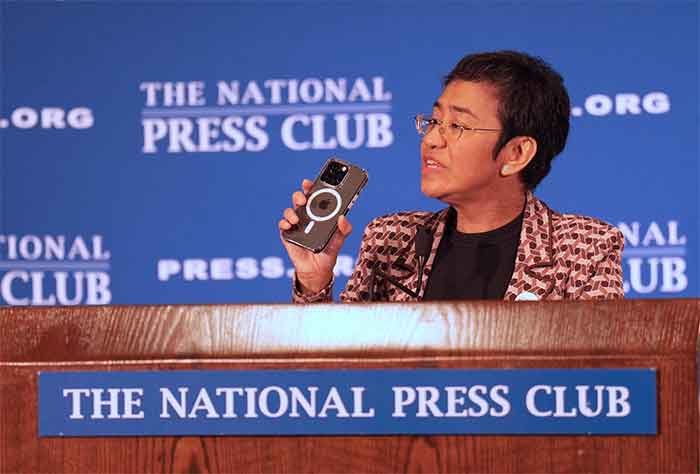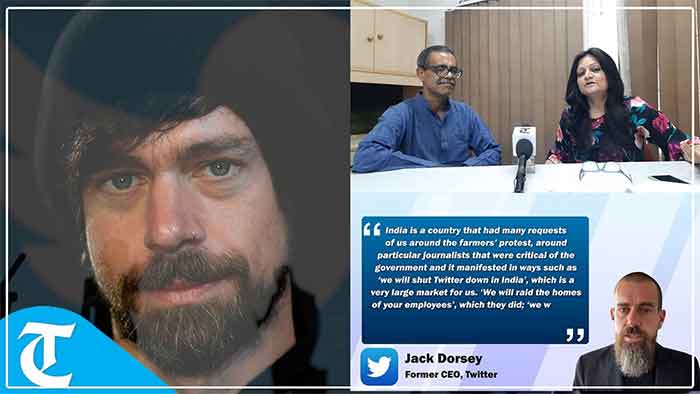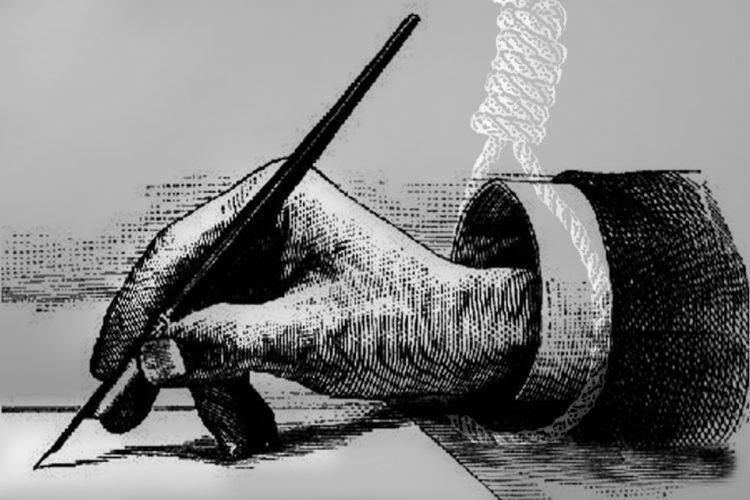
Nobel Laureate journalist Maria Ressa spoke at the National Press Club Headliners luncheon September 5 discussing the existential threat of press freedoms faced by journalists and media worldwide and warned about the demise of democracy in the wake of those threats.
Ressa, however, believes countering press repression and misinformation opens opportunities for civil society to rise to the challenge in helping maintain a free press and informed public that in turn helps maintain strong democratic principles and institutions.
Her investigative journalistic work in the Philippines exposing the abuse of power and corruption of President Rodrigo Duterte along with his 2016 “war on drugs” has subjected her to numerous arrests, intimidation and lawsuits. Duterte’s “drug war” allowed and encouraged the extrajudicial killings of people who were rumored or suspected of being involved with drugs culminating in the deaths of 6,500 to 29,000 with no one being held accountable for their actions.
Because of journalists exposing Duterte’s corruption along with criticism directed at him, journalists were labeled as criminals in manipulating public opinion against any counter narratives in a concerted effort to discredit journalists along with the truth.
In an attempt to silence Ressa, she now faces up to 100 years in jail on charges including those in a Philippine cyber libel case along with violation of a law concerning foreign media ownership, while press freedom advocates have called for all remaining charges against her to be dismissed.
For her to appear at the luncheon in Washington she had to go “all the way to the Philippine Supreme Court to be with you today as they have to approve my travel plans.” And despite that, Rappler, the Philippine internet news organization she founded, is still doing stories on corruption, misinformation and on gender misinformation.
Eclipsing her own personal experience, she characterized the worldwide assault on the news media and journalists as “The tech-enabled Armageddon that we are living through.” She warned that there are three existential threats facing the news today. “One, how technology is insidiously manipulating us, changing our behavior: Two, how we are walking into the last two minutes of Democracy” and finally “What we need to do.”
“Beyond all those challenges and problems, we have always had, we now have ‘Big Data.’ Big data has changed everything, the increased computational power of our machines has allowed technology companies to hack our biology, to change the way we think and act by inciting our emotions. The prize is our attention. This is the new economic system, the attention economy with a new business model.” She went on to note Professor Susanna Zuboff’s book ‘The Age of Surveillance Capitalism’ which “extracts our private lives for outsized corporate gain.”
She further noted that the last time such a “…commodification of humans occurred was during the Industrial Revolution” when labor was exploited by robber barons for profit and gain. The reaction to which was the formation of unions to counter rampant worker exploitation.
“Today’s new robber barons are CEOs of technology companies involved in surveillance capitalism…” Their goal being to undermine human will by manipulating the very information they collect. “We are Pavlov’s dogs, experimented on in real time, with disastrous consequences.”
She further warned that all our Facebook posts along with other aggregate information collected on each of us “…helps build a model of you that knows you better than you know yourself.” And that without our permission, we are cloned for exploitation, profit and manipulation with the company’s claiming ownership of our clones.
“In 2018 MIT published a study that showed that lies spread six times faster than the boring facts we journalists use. If you have no facts, you cannot have truth. Without truth you cannot have trust. Without these three we have no shared reality, no rule of law, we have no democracy. Journalists, human rights defenders, anyone under attack, are defenseless against this information warfare.”
In her book, “How to Stand up to a Dictator” she exposed how in 2014 Russia seeded a narrative using information warfare in annexing Crimea by suppressing facts and creating a new narrative of oft repeated false claims. This technique was used again in 2022 prior to Russia’s invasion of Ukraine.
Ressa went on to illustrate how the Philippines in 2014 began a misinformation campaign in transforming former President Ferdinand Marcos from a dictator kleptocrat into the “Best president the Philippines ever had.” Thus, paving the way for his son Ferdinand “Bongbong” Marcos junior to be elected president.
She warned that living in both our cyber and physical worlds, allows for online violence to become real world violence and “If you can make the people believe lies are facts then you can control them.”
In our new world she suggested that we need new laws to protect us from lies. “This is not a Freedom of Speech issue; this is an engineering issue. These technology companies, the new gatekeepers into our public spheres, is the least regulated industry globally.” She illustrated her point buy holding up her cell phone and related how “The toaster in your home here in the U.S. has to pass more safety regulations than this.”
Aside from the foreboding of the truth being sacrificed for manipulation and profit by AI and technology companies, it is important to note, too, how recently the Marion County Record, a small-town Kansas newspaper, was invaded by local police. Bearing a search warrant seeking evidence of an alleged crime of identity theft, the police confiscated all the papers, computers and equipment at the newspaper office and the homes of the editor and some staff members. Their zealous investigation was later overturned by a second court that ruled the original search warrant invalid after a worldwide outcry from press and free speech advocates, but not before the death of the paper’s elderly co-owner.
Technology being used to form and manipulate news and information is only the most recent iteration of long-standing attacks against the press. One of the earliest challenges in the U.S. started with the 1798 Aliens and Sedition Act passed by the Fifth Congress allowing the government to limit the freedom of speech and the press that allowed for the jailing of newspaper editors and others who criticized President John Adams and his administration. The act expired in 1801.
It was soon to be followed by The Sedition Act of 1918 of World War I which targeted those individuals who interfered with the military draft and who publicly criticized the government.
Attacks against a free press unfortunately will always be a threat and while the methods and technology have changed with the times, citizens along with journalists must become more sophisticated and discriminating when consuming the massive deluge of information we are each faced with daily in order to remain alert and aware of being manipulated in seeking the truth.
Photo by Phil Pasquini
(This article has appeared in Nuzeink)
Phil Pasquini is a freelance journalist and photographer. His reports and photographs appear in the Washington Report on Middle East Affairs, Pakistan Link and Nuze.ink. He is the author of Domes, Arches and Minarets: A History of Islamic-Inspired Buildings in America.
© 2023 nuzeink all rights reserved worldwide















































